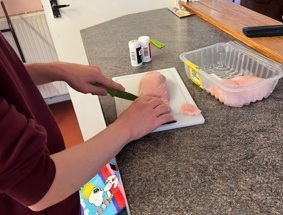When you foster a child with us, you don’t raise them alone. You’ll be part of a team of people who are all committed to delivering life-changing outcomes for children and young people in care. What makes us different to other fostering agencies is that everyone involved understands that children and young people with histories of trauma, abuse, neglect or attachment difficulties need therapeutic input to help their wellbeing and development.
When it comes to child development, musical play can be an impactful technique for growth and healing. Music has a way of captivating our senses and stirring emotions within us. In the case of children in foster care, who have experienced disruption and trauma, musical play takes on a special significance. Here, we’ll explore the benefits of musical play in encouraging the healthy development of children in care, providing them with a nurturing and transformative experience.

What is musical play?
Musical play refers to the engaging and interactive exploration of music through various activities such as singing, dancing, playing instruments, and creating rhythms and melodies. Similar to play therapy, it encourages children to actively participate, express themselves creatively, and develop a deeper connection with the world of music.
Why is musical play important for child development?
Musical play plays a crucial role in a child’s overall development, nurturing various aspects of their growth:
How can musical play help children in foster care?
Musical play holds a lot of potential for positively impacting the lives of children in foster care.
- Self-expression and empowerment: Musical play allows children to express themselves freely, helping them find their voice and assert their identity. Through singing, playing instruments, and creating music, children can tell their stories, share their experiences, and celebrate their uniqueness. This empowers them with a strong sense of self-esteem and personal growth. At FCA, we are advocates for the children in our care and ensuring their voices are heard is something we’re deeply passionate about.
- Building trust and attachment: The interactive nature of musical play creates opportunities for connection and trust-building. Engaging in musical activities with caregivers and peers builds a sense of safety and security. It helps children in foster care develop positive relationships and build healthy attachments, which are crucial for their emotional well-being and overall development.

How does musical play work?
Musical play therapy contributes towards child development through various ways:
Emotional Engagement
Music has a direct impact on our emotions. It can evoke joy, sadness, excitement, or calmness. Through musical play, children in foster care can explore and express their emotions in a safe and non-threatening way. The melodies, rhythms, and lyrics allow them to connect with their feelings and experience a range of emotions, promoting their emotional well-being and helping them process their experiences.
Sensory stimulation
Musical play engages multiple senses simultaneously. Listening to music, feeling the vibrations of instruments, and participating in rhythmic movements activate the auditory, tactile, and kinesthetic senses. This sensory stimulation enhances sensory integration, promoting coordination, balance, and fine motor skills development.
Neurological activation
Engaging in musical play activates various areas of the brain. Playing instruments, singing, and listening to music stimulate neural connections, promoting brain development and cognitive abilities. The brain’s response to music enhances memory, attention, and pattern recognition, fostering cognitive growth and intellectual skills.
5 types of musical play techniques
There are several techniques and activities that can be incorporated into musical play, but what’s important to remember is that musical play doesn’t have many rules. And that’s the beauty of it! It’s there to help children feel connected to the moment while simultaneously boosting their self-esteem and promoting healthy development.
-
Singing
Singing is a fundamental and totally accessible form of musical play, and it’s close to our hearts here at FCA. Every year, we host The Big Sing off to bring our community together for a day of music and singing. But you can sing anywhere you like, all year round! Children can sing along to familiar songs or learn new ones. Singing helps with language development, vocabulary expansion, and self-expression. It can be done individually or in groups, providing opportunities for social interaction and building confidence. Why not have a sing-along to your foster child’s favourite records and enjoy a therapeutic release of emotions while making happy memories?
-
Instruments
Providing children with access to various musical instruments allows them to explore different sounds and textures. They can experiment with percussion instruments like drums or xylophones, or try their hand at string or wind instruments. Instrument exploration enhances fine motor skills, hand-eye coordination, and processing sounds, which can also be extremely beneficial for autistic children.
-
Movement and dance
Bringing movement and dance into musical play encourages physical activity and self-expression. Children can sway, jump, or dance to the rhythm of the music. This not only enhances gross motor skills but also allows them to release energy, improve coordination, and experience the joy of dance, because everyone loves a boogie from time to time!
-
Songwriting
Encouraging children to create their own songs is a powerful form of musical play. They can write lyrics, invent melodies, and experiment with different musical elements. This activity promotes creativity, self-expression, and fosters a sense of ownership and accomplishment.
-
Music listening and reflection
Listening to different genres of music and reflecting on how the songs make you feel can be a valuable aspect of musical play. Children can discuss their interpretations, share their feelings, and connect with the music on a deeper level. This activity promotes active listening, critical thinking, and emotional engagement.
In child development, musical play shines as a transformative force, particularly for children in foster care who have experienced a lot of anguish in their early lives. By engaging in musical play, these children can express their emotions, develop cognitive and social skills, experience healing, and find empowerment.
Could you give a vulnerable child a loving home?
There are thousands of children who are still waiting for a loving, safe foster home where they can experience joy and the comfort of a stable childhood. If you’re aged 21 or over, have the legal right to live and work in the UK, and also have a spare bedroom, we’d love to hear from you. We offer an exceptional support package, generous allowances and provide all the training you need to become a foster parent.
Please get in touch and our friendly fostering advisors will get back to you to tell you more about fostering with FCA and answer any questions you have.






